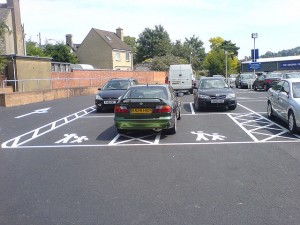"Mager" has three common translations related to body volume, quality or food.
1. slim, thin, skinny [adjective/adverb] ![]()

This is the most common translation of "mager": the opposite of "fat". We also say "dun" ("thin"), but "mager" is ‘thinner than thin’ and is more associated with not eating enough.
Examples:
– "Een collegaatje van mij is zo mager, we vragen ons af of ze wel goed eet!"
("A (female) colleague of mine is so thin, we wonder whether or not she eats properly!")
– "Veel sporten is goed voor de lijn, maar je moet niet te mager worden."
("Exercising often is good for the figure, but you shouln’t become too skinny.")
– "Kate Moss dun? Mager zal je bedoelen!"
("Kate Moss thin? You must mean skinny!")
Related words:
– Broodmager: scrawny [adjective].
– Dun: thin [adjective/adverb].
– Dik: fat [adjective/adverb].
– Afvallen: to lose weight [verb] [viel af, afgevallen].
– Aankomen: to gain weight [verb] [kwam aan, aangekomen].
– Dieet: diet [noun] [het dieet, de diëten].
2. feeble, weak, poor [adjective/adverb]
You can also use "mager" to indicate low quality or poor performance.
An interesting development in the Dutch language is that we sometimes create an informal version of an adjective by turning it into what I can best describe as a "plural diminutive". Which is weird for an adjective! 🙂 So in this case you could say that something is "magertjes". See the examples. You might also hear it applied in the first translation above. Other examples of this phenomenon are "zachtjes" (quietly) or "eventjes" (for a short while).
Examples:
– "Ik vond de bijdrage van Frank wat magertjes. Normaal gesproken levert hij betere kwaliteit!"
("I found Frank’s contribution quite poor. Usually he provides better quality!")
– "Wat een mager excuus, hij wist toch al lang dat hij dat weekend vrij moest houden in zijn agenda!"
("What a feeble excuse, surely he has known for a long time that he was supposed to block that weekend off in his calendar!" Note that Dutch people use the word "agenda" for a diary, organizer or (pocket) calendar. So don’t be sruprised when they go and "check their agenda". The Dutch like to use the English word "weekend" but we have a perfectly acceptable Dutch word for that which is "weekeinde".)
Related words:
– Matig: moderate, mediocre [adjective/adverb].
– Kwaliteit: quality [noun] [de kwaliteit, de kwaliteiten].
3. lean, meagre [adjective/adverb]
You might prefer "skimmed" milk over "semi-skimmed" milk. In the Netherlands you would then buy "magere melk" instead of "halfvolle melk". Note that "halfvol" literally means "half full". If a Dutch person ever asks you about "full milk", then probably he or she means "whole milk".
Regarding food you might hear "magere kost" ("lean fare") or "mager vlees" ("lean meat").

 This phrase is used when you convince yourself that you shouldn’t care, don’t want to care, or just don’t care when making a decision.
This phrase is used when you convince yourself that you shouldn’t care, don’t want to care, or just don’t care when making a decision.

